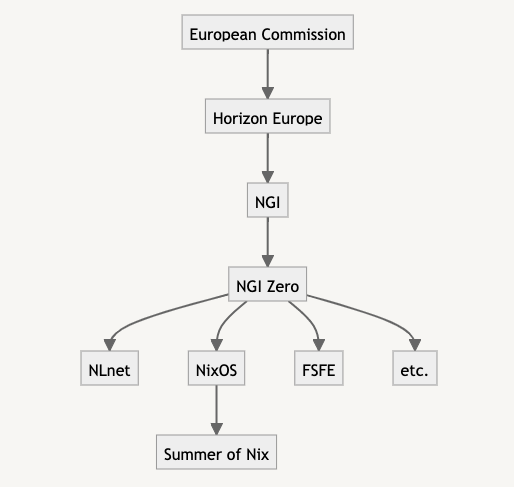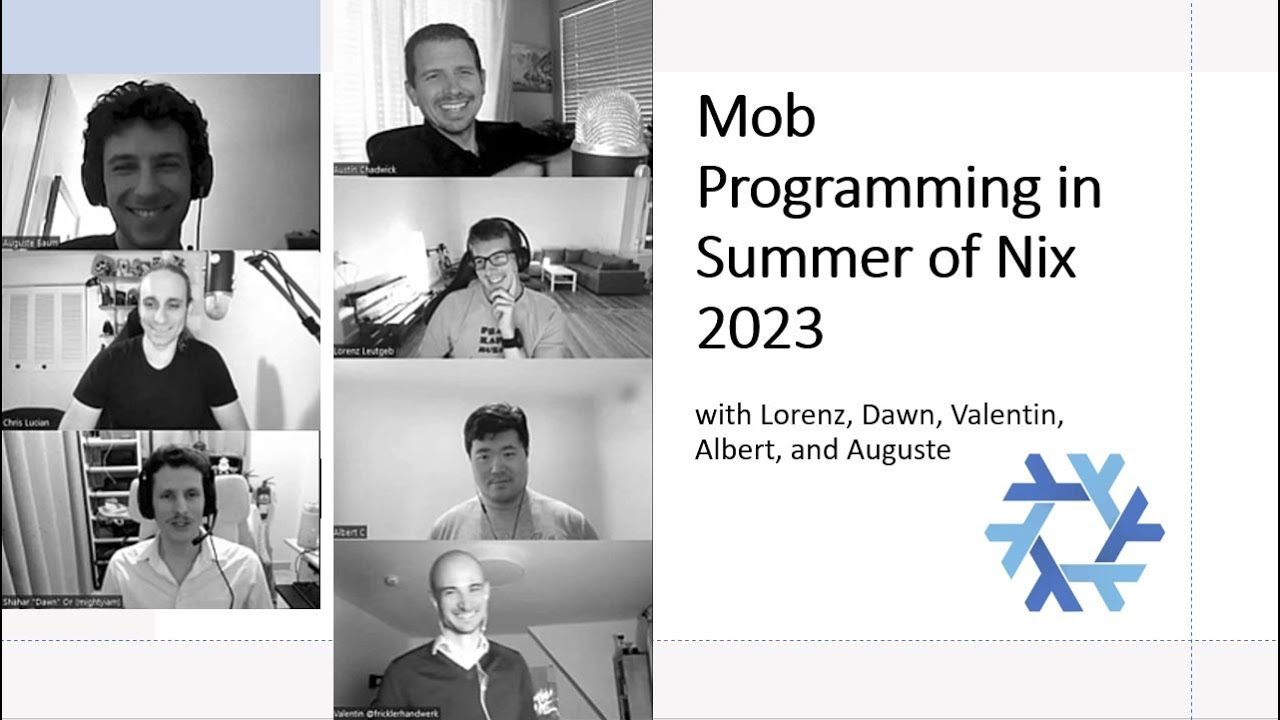Hello everyone, and welcome to this year’s Summer of Nix!
My name is Valentin, and I support program organisers @mightyiam and @mat on behalf of the NixOS Foundation. My mission is primarily to facilitate communication: make sure everyone knows what’s important for whom and why, get the right people together to answer questions and solve problems, and make the results of your work visible – so you can focus on writing code.
What Summer of Nix is about
Summer of Nix is the NixOS Foundation’s contribution to the European Commission’s Next Generation Internet (NGI) initiative, which is part of the Horizon Europe program. The NixOS Foundation partners with NLnet and others within the NGI Zero consortium to help fulfil the NGI objectives of fostering technological innovation and working towards a more resilient and participatory digital infrastructure. Our goal is to assist projects funded through NGI Zero with reproducible packaging and declarative configurations using Nix, while growing the community of developers that have the necessary skills and experience to maintain these setups.

Horizon Europe is a huge program with a total volume of 95.5 billion EUR. NGI has a budget of more than 300 million EUR, and is subdivided into multiple funds. Currently NGI Zero manages NGI Zero Entrust, NGI Zero Review, and NGI Zero Core, totalling at 24.5 million EUR. Part of that money – ca. 90 000 EUR for each of 2023, 2024, and 2025 – is allocated to the NixOS Foundation to provide packaging services and to strengthen the FOSS ecosystem by improving tooling and processes.
This year is the third instalment of the Summer of Nix program, and you can browse the reports from 2021 and 2022 and this year’s call for participants for details if you’re curious.
This year’s goals
Together with NLnet’s director of strategy Michiel Leenaars and project manager Ronny Lam, and based on the past two years of experience with Summer of Nix, we developed the following goals for this year’s program:
-
Cater to software developers
Developers build the Next Generation Internet, and developer tooling is where Nix, Nixpkgs, and NixOS already shine. We will put emphasis on robust, readable code, sane workflows, and good documentation targeted at domain experts.
-
Focus on three major topics:
-
Open Hardware Ecosystem
Provide out-of-the-box access to toolchains for designing libre silicon and PCBs, and get FPGAs up and running reproducibly. We want the Nix ecosystem to be the default for hardware designers, and be prepared for the activity around the European Chips Act.
-
Self-hosting and service portability
Building software reproducibly is not enough. Being able to deploy services with minimal effort is key to fostering adoption of new web technologies that give their users more agency and control. We will develop or extend NixOS modules for web projects to enable customisable self-hosting or porting services between hosting providers.
-
Federated services
Support projects implementing ActivityPub with convenient service configuration through NixOS. This continues efforts from past years.
-
-
Increase visibility and improve discoverability
Software projects supported through NGI Zero should be easy to find and get to work. We will set up a unified package and service module repository with continuous integration, automatic updates, and searchable documentation.
These goals are designed with current constraints and future opportunities in mind, and also address difficulties we experienced in previous years. While in the past the program went into breadth, this time we will focus on fewer, high-impact objectives and establish sustainable workflows that will carry the program over the next three years and beyond. We want to direct our attention towards software projects with far reach or great potential, where taming complex builds, dependencies, or configurations with Nix would provide the most benefit to their maintainers, contributors, or users now and in the long run.
Working in public
Summer of Nix puts learning and knowledge sharing front and center. And we know that it’s not just that code that matters, but also how it’s made. To share with everyone what we do and learn, we will post updates on activities and results in this thread. See also the NGIpkgs issue tracker for the tasks the teams are working on. Maybe you will participate next year?
Have a great Summer of Nix!
